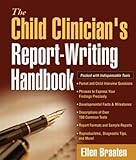The child clinician's report-writing handbook/ Ellen Braaten
Material type: TextPublication details: New York: Guilford Press, c2007Description: xx, 380 pISBN: 9781593853952 (pbk. : alk. paper)Subject(s): Neuropsychological report writing -- Child psychiatry | Interviewing in child psychiatryDDC classification: 618.9289
TextPublication details: New York: Guilford Press, c2007Description: xx, 380 pISBN: 9781593853952 (pbk. : alk. paper)Subject(s): Neuropsychological report writing -- Child psychiatry | Interviewing in child psychiatryDDC classification: 618.9289 | Item type | Current library | Collection | Call number | Status | Date due | Barcode | Item holds |
|---|---|---|---|---|---|---|---|
 Reference Books
Reference Books
|
Central Library, Sikkim University Reference | Reference Collection | 618.9289 BRA/C (Browse shelf(Opens below)) | Not For Loan | P27215 |
Browsing Central Library, Sikkim University shelves, Shelving location: Reference, Collection: Reference Collection Close shelf browser (Hides shelf browser)

|

|

|

|

|

|

|
||
| 618.92 ROB/H Handbook of Pediatric Psychology/ | 618.928527 ABE/H Handbook of Depression in Children and Adolescents/ | 618.9289 AMM/H Handbook of Pediatric Psychology and Psychiatry; Vol. 2. | 618.9289 BRA/C The child clinician's report-writing handbook/ | 618.9289 OLL/E Encyclopedia of clinical child and pediatric psychology/ | 618.9289 OLS/S The Sourcebook of pediatric psychology/ | 618.9289 REY/H Handbook of clinical child neuropsychology (critical issues in neuropsychology)/ |
I. Questions for Conducting a Psychological Evaluation of a Child or Adolescent1. Beginning the Interview2. Questions for Parents on Signs, Symptoms, and Behavior Patterns3. Observation Procedures and Questions for Children and Adolescents4. Questions for Teachers or Other Professionals5. The Formal Mental Status Exam with Children and Adolescents6. Ending the Interview II. Standard Terms and Statements for Wording Psychological ReportsA. Introducing the Report7. Beginning the Report8. Reasons for ReferralB. Background and History9. History of Current and Past Symptoms10. Medical and Psychiatric Background Information11. Developmental and Family History12. Academic and School HistoryC. The Child or Adolescent in the Evaluation13. Behavioral Observations14. Attitude toward Testing15. Affective Symptoms and Mood/Anxiety Disorders16. Childhood Behavioral and Cognitive DisordersD. The Child or Adolescent in the Environment17. Home and Family18. School19. Social and Work Relationships, Recreational ActivitiesE. Test Results20. General Guidelines for Presenting Test Results in a Report21. Tests of Intellectual Functioning22. Achievement Measures23. Tests of Language Functioning24. Memory Tests25. Tests of Visual-Spatial and Motor Skills26. Measures of Executive and Neuropsychological Functioning27. Measures of Emotional and Personality Functioning28. Behavior Rating Scales and Tests of Adaptive FunctioningF. Ending the Report29. Diagnostic Statements/Impressions30. Summary of Findings and Conclusions31. Recommendations32. Closing StatementsIII. Special Circumstances and Useful Resources33. Writing for the Schools34. Treatment Planning35. Report Formats and Sample Reports36. Resources for Professionals37. Resources for Parents38. Medications39. Abbreviations in Common Use40. Useful Forms


There are no comments on this title.